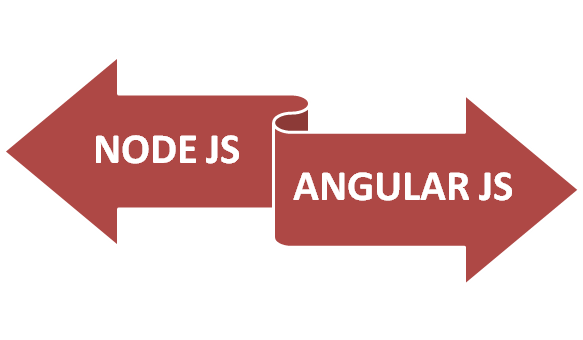NodeJS vs. AngularJS – The Differences
Owing to rapid advancements, today there is an array of technologies available to build highly robust and scalable web applications. Node.js and Angular.js are no different. Though both are used to create a wide spectrum of web applications, they are quite different as they are built to serve different purposes.
Understanding the differences between both the technologies would help you determine which is the ideal choice for your web application. This blog discusses Node.js vs. Angular.js comprehensively to help you make a smart decision.
What is NodeJS?
It is a cross-platform runtime environment and runtime system for web applications written in JavaScript. It uses V8 JavaScript engine to execute codes of an application, and is written in JavaScript, C, and C++. It works quite similar to Java Runtime Environment, Adobe Flash Player for ActionScript, Android Runtime for Android application and Common Language Runtime for .NET programs. It is ideal for developing real-time web applications, and server-side networking. It uses JavaScript code on the server to render pages even before users’ browsers are involved. It serves as web server software, which sends bulk pages to users’ browsers, though not directly always. You can write applications in Node to execute functions on users’ devices without the need to run in a browser.
What is AngularJS?
Angular.js is a front-end MVC framework for web applications based on JavaScript. It facilitates creating single-page applications fast and seamlessly. Unlike other frameworks like jQuery, it is designed to be a platform on which the entire web application is built. Programming with this architecture is functional, object-oriented, and event-driven. It is primarily designed for client-side web application development. This means it gets executed on the browser after a page has arrived in that browser, adding or manipulating things or establishing cool effects. It comprises of several directives that can be modified easily and sued on requirement.
The Differences…

1. Installation and Compatibility: Node.js is compatible with Windows, Linux, OS X, and Sun Operating System. It can be installed easily and quickly. Post installation, node applications can be written using JavaScript language.
On the other hand, Angular.js is a JavaScript-based application that does not need to be installed separately on devices. Just add the file like any other JavaScript file being added in HTML document. It is compatible with Firefox, Chrome, Opera 15, Safari, Internet Explorer 9, and mobile browsers such as Android Browser, Safari for iOS, and Chrome for Mobile.
2. Applications and Uses: NodeJS typically supports an event-driven architecture and non-blocking input/output API, ideal to build real-time web applications like chat apps or instant messaging. It has a number of built-in core modules that can be used to build a web server in Node application without having to use any other web server programs such as Nginx, Apache, and IIS. There are several frameworks based on this technology, having a wide range of features that can be used to seamlessly create different types of applications. Node.js is very effective to develop highly scalable and ultra fast networking and server-side applications.
Coming to Angular.js, it allows developers to extend HTML’s syntax to clearly define the components and features of your application. It helps build MVC components on the client-side as unlike client-side for Node. Unlike other frameworks that support one-way data binding in applications, AngularJS supports MCV pattern with two-way data binding, which makes it a very popular web application development framework. Changes in the VIEW are displayed in the MODEL, while the changes in MODEL are propagated to the VIEW. This streamlines the process of programming substantially. It is an ideal choice to build single-page applications.
To conclude, both are designed to build web applications using JavaScript. However, they are quite different in their use, architecture and system.
Find a course provider to learn Node JS
Java training | J2EE training | J2EE Jboss training | Apache JMeter trainingTake the next step towards your professional goals in Node JS
Don't hesitate to talk with our course advisor right now
Receive a call
Contact NowMake a call
+1-732-338-7323Enroll for the next batch
Node JS Hands-on Training with Job Placement
- Jan 28 2026
- Online
Node JS Hands-on Training with Job Placement
- Jan 29 2026
- Online
Node JS Hands-on Training with Job Placement
- Jan 30 2026
- Online
Related blogs on Node JS to learn more

Why NodeJS Has an Edge over PHP?
The web is flooded with technologies from the very simple to the complex ones. New and improved technologies are continuously being developed to replace the old ones. Here a comparison has been made between Node.js and PHP to show that Node.js is bet

A Synopsis of the Best Node JS Frameworks For Web and Apps Development
Node JS is a cross-platform, open-source runtime environment, which is used for the development of server-side web applications. It is not a JavaScript framework but many of its modules are written in the JavaScript and the developers can write the n
Latest blogs on technology to explore

Drug Safety & Pharmacovigilance: Your 2026 Career Passport to a Booming Healthcare Industry!
Why This Course Is the Hottest Ticket for Science Grads & Healthcare Pros (No Lab Coat Required!)" The Exploding Demand for Drug Safety Experts "Did you know? The global pharmacovigilance market is set to hit $12.5B by 2026 (Grand View Research, 202

Launch Your Tech Career: Why Mastering AWS Foundation is Your Golden Ticket in 2026
There’s one skill that can open all those doors — Amazon Web Services (AWS) Foundation

Data Science in 2026: The Hottest Skill of the Decade (And How Sulekha IT Services Helps You Master It!)
Data Science: The Career that’s everywhere—and Nowhere Near Slowing Down "From Netflix recommendations to self-driving cars, data science is the secret sauce behind the tech you use every day. And here’s the kicker: The U.S. alone will have 11.5 mill

Salesforce Admin in 2026: The Career Goldmine You Didn’t Know You Needed (And How to Break In!)
The Salesforce Boom: Why Admins Are in Crazy Demand "Did you know? Salesforce is the 1 CRM platform worldwide, used by 150,000+ companies—including giants like Amazon, Coca-Cola, and Spotify (Salesforce, 2025). And here’s the kicker: Every single one

Python Power: Why 2026 Belongs to Coders Who Think in Python
If the past decade was about learning to code, the next one is about coding smarter. And in 2026, the smartest move for any IT enthusiast is learning Python — the language that powers AI models, automates the web, and drives data decisions across ind

The Tableau Revolution of 2025
"In a world drowning in data, companies aren’t just looking for analysts—they’re hunting for storytellers who can turn numbers into decisions. Enter Tableau, the #1 data visualization tool used by 86% of Fortune 500 companies (Tableau, 2024). Whether

From Student to AI Pro: What Does Prompt Engineering Entail and How Do You Start?
Explore the growing field of prompt engineering, a vital skill for AI enthusiasts. Learn how to craft optimized prompts for tools like ChatGPT and Gemini, and discover the career opportunities and skills needed to succeed in this fast-evolving indust

How Security Classification Guides Strengthen Data Protection in Modern Cybersecurity
A Security Classification Guide (SCG) defines data protection standards, ensuring sensitive information is handled securely across all levels. By outlining confidentiality, access controls, and declassification procedures, SCGs strengthen cybersecuri

Artificial Intelligence – A Growing Field of Study for Modern Learners
Artificial Intelligence is becoming a top study choice due to high job demand and future scope. This blog explains key subjects, career opportunities, and a simple AI study roadmap to help beginners start learning and build a strong career in the AI

Java in 2026: Why This ‘Old’ Language Is Still Your Golden Ticket to a Tech Career (And Where to Learn It!
Think Java is old news? Think again! 90% of Fortune 500 companies (yes, including Google, Amazon, and Netflix) run on Java (Oracle, 2025). From Android apps to banking systems, Java is the backbone of tech—and Sulekha IT Services is your fast track t